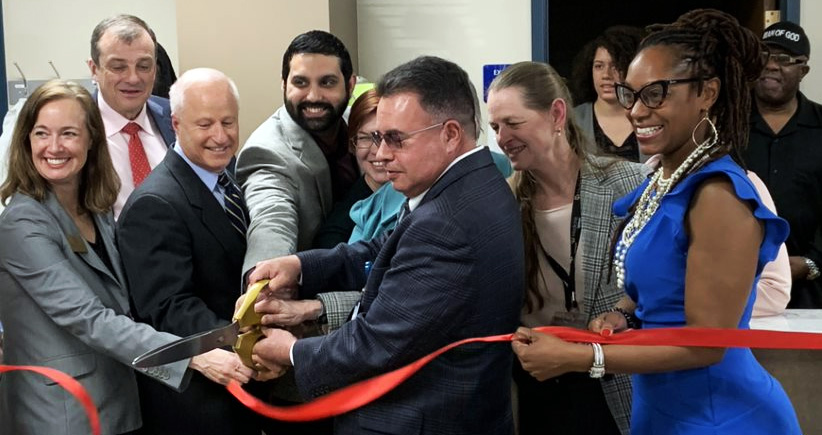 CU School of Medicine Dean John Reilly, MD, (second from the left) and Senior Associate Dean for Clinical Affairs Anne Fuhlbrigge, MD, (fourth from the right) joined community leaders to celebrate the opening of a new federally qualified health center in Aurora.
CU School of Medicine Dean John Reilly, MD, (second from the left) and Senior Associate Dean for Clinical Affairs Anne Fuhlbrigge, MD, (fourth from the right) joined community leaders to celebrate the opening of a new federally qualified health center in Aurora.
New Clinic is ‘Bigger than What’s in These Four Walls’
CU partners with Salud to provide care to Aurora residents
By Mark Couch
(May 2020) The University of Colorado School of Medicine joined Salud Family Health Centers in February to celebrate the grand opening of a new federally qualified health center in Aurora that will serve community residents who depend on Medicaid for health insurance.
The clinic is the initial step in a larger partnership between CU and Salud to bring options for healthier living to Aurora residents. Salud has purchased 27 acres on the southeast corner of Airport Boulevard and East Colfax Avenue, where Salud plans to develop the Aurora Community Health Commons.
John Santistevan, president and CEO of Salud, said the long-term goal is to provide a site for Aurora residents that promotes healthy living in addition to providing medical care.
“We’re looking at this as a bigger project than what’s in these four walls,” Santistevan said at the ribbon-cutting ceremony for the clinic on Sable. “In three years, we’re going to have a commons campus that will be addressing a lot of the social determinants of health.”
At the commons location, Salud plans provide housing, an urban farm and healthy food options, exercise equipment, job training, and many other services.
Salud is a private nonprofit that was established 50 years ago in Fort Lupton and now has 13 clinics, 11 school sites, and a mobile unit in Colorado to provide medical, dental, pharmacy, and behavioral health services. Last year, Salud served 82,000 patients who made 360,000 visits to Salud clinics.
“The vision was really originated by Dean John Reilly. We would not be here in Aurora if the CU School of Medicine did not invite us and it really was the Dean’s vision to do this,” Santistevan said. “We’ve been working on this project for two years. It’s been a lot of planning and a lot of work, and on January 13 we saw our first patient here.”
John Reilly, Jr., MD, dean of the CU School of Medicine, said the partnership with Salud is a natural extension of previous work the School and Salud have done together. In Fort Morgan, there is a family medicine residency program at the Salud clinic there. Some CU medical students also complete clinical training rotations at Salud clinics.
The Aurora project aims to address a significant need for improve access to primary care in the neighborhoods surrounding the Anschutz Medical Campus. An analysis of three ZIP codes - 80010, 80011, and 80012 - found that an estimated 48,000 people did not have primary care providers.
“Even though Medicaid expansion has provided them with insurance coverage, it does not necessarily provide them good access to primary care,” said Reilly. “So it’s a real privilege for us to take a leap with a partner.”
CU faculty members already provide care to patients who depend on Medicaid, with the School’s medical practice caring for about 160,000 patients with Medicaid, with children accounting for about 100,000 of them.
“We think we can accomplish a few things, improve access to primary care for the population right around our campus, our neighbors and friends. We’re going to co-locate specialty care right on [Aurora Community Health Commons]. ... It’s going to be the stop to get their medical needs met.”
Anne Fuhlbrigge, MD, senior associate dean for clinical affairs, said the partnership offers a new opportunity to expand the interdisciplinary team-based training.
“We have representatives from all the different disciplines and all the different schools that want to be part of this,” she said. “Even off-campus groups are interested. The College of Architecture and Planning, which is on the downtown CU campus, wants to be involved in helping to make the commons a focus of health, not just health care.”
In addition to providing multidisciplinary care, the commons will provide an opportunity for training future providers to work together.
“We want to think about the interdisciplinary, inter-professional nature of the care we provide on that campus and how we teach the next generation of providers who come to that campus to learn how to provide care in
a true team-based approach.”
Feature Stories
- Building Professional Resilience Through Creative Arts
- Model Hearts and Virtual Reality
- Improving Care for Colorado; CU School of Medicine expands access to care statewide
- New Clinic is ‘Bigger than What’s in These Four Walls’
- Innovative Palliative Care Fellowship Program
- Leadership, Curiosity, Commitment; School of Medicine updates curriculum for medical students
- Student Voice: The Gift of Gratitude
- Faculty Matters: What Every Doctor Should Know About the Holocaust
Profiles
- Searching For Cures to Lung Diseases
- Osseointegration surgery offers hope for better, faster, stronger life
- Building a Team, Not Just a Building; Hospital leader receives life-saving care after stroke at work